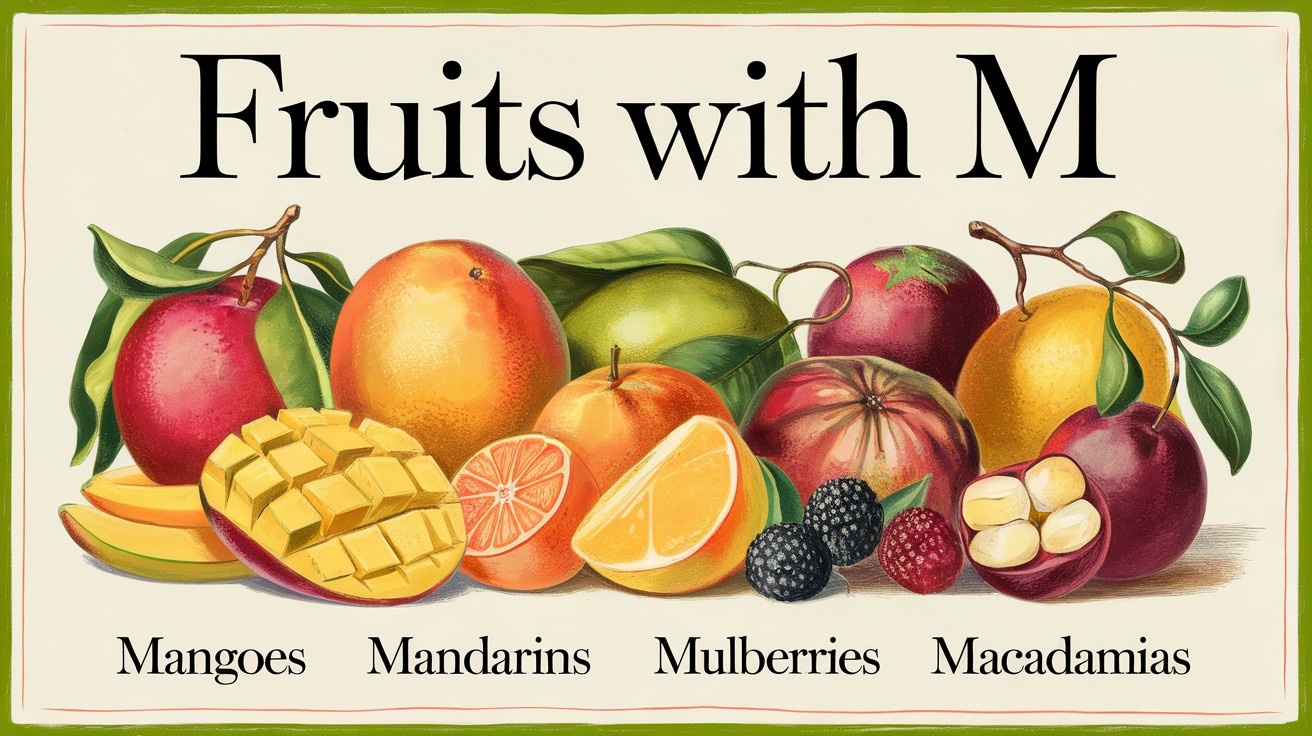
From the tough shells of Australian-born macadamias to the refreshing sweetness of Indian musk melons, the planet offers an astonishing array of fruits waiting to be savored.
These natural wonders carry stories from their native lands—some traveled ancient trade routes while others remained local secrets until recently.
Beyond their mouthwatering flavors, these fruits hold remarkable health benefits. The macadamia’s heart-healthy fats, the vitamin-rich Mamey Sapote’s skin-nourishing properties, and the immunity-boosting power of Meyer lemons are just the beginning.
Did you know the mango tree can produce fruit for three centuries? Or that Miracle Fruit can make sour foods taste sweet? Each variety brings its distinctive character to the table.
Join us in uncovering these botanical jewels and their remarkable attributes from around the world.
Botanical Treasures: Finding the World of ‘M’ Fruits

1. Macadamia Nuts
Origin: Australia
Health Benefit: Rich in healthy fats and antioxidants.
Fun Fact: Macadamia nuts are toxic to dogs but enjoyed worldwide.
2. Macoun Apple
Origin: United States
Health Benefit: High in fiber and vitamin C.
Fun Fact: Known for its sweet and tart flavor, it’s great for baking.
3. Madison Peach
Origin: United States
Health Benefit: Good source of vitamins A and C.
Fun Fact: Peaches are often considered a symbol of immortality in China.
4. Madras Thorn
Origin: India
Health Benefit: Used for its medicinal properties, particularly in treating digestive issues.
Fun Fact: The tree is often used for its shade in tropical climates.
5. Madrono
Origin: North America
Health Benefit: Rich in vitamins and used to treat throat infections.
Fun Fact: The tree’s bark is red and peels off in large strips.
6. Magellan Barberry
Origin: South America
Health Benefit: Known for its antimicrobial and anti-inflammatory properties.
Fun Fact: Often used in traditional medicine for digestive issues.
7. Malabar Plum
Origin: India
Health Benefit: High in antioxidants and vitamin C.
Fun Fact: Also known as the Java plum, it’s a favorite in tropical regions.
8. Malay Rose Apple
Origin: Southeast Asia
Health Benefit: Rich in vitamin C and helps in digestion.
Fun Fact: The fruit is known for its bell shape and sweet taste.
9. Malus Sieversii
Origin: Central Asia
Health Benefit: A wild ancestor of modern apples, offering antioxidants.
Fun Fact: It is considered one of the parents of all cultivated apples.
10. Mamey
Origin: Central America
Health Benefit: High in potassium and great for heart health.
Fun Fact: Its flesh is often used in smoothies and ice cream.
11. Mamey Apple
Origin: Central America
Health Benefit: Packed with fiber and vitamin C.
Fun Fact: This fruit has a sweet, custard-like texture.
12. Mamey Sapote
Origin: Mexico
Health Benefit: Rich in vitamins A and C, it aids skin health.
Fun Fact: Known for its creamy, sweet flavor, often used in desserts.
13. Mamin Chino
Origin: Central America
Health Benefit: Rich in fiber, it aids digestion.
Fun Fact: The fruit is green when unripe and turns yellow when ripe.
14. Mammee Apple Fruit
Origin: Caribbean
Health Benefit: Used to treat colds and digestive issues.
Fun Fact: The fruit has a firm texture and is often eaten raw.
15. Mamoncillo
Origin: Caribbean
Health Benefit: High in vitamin C and antioxidants.
Fun Fact: It is also known as Spanish lime and has a tart, sweet flavor.
16. Manchurian Apricot
Origin: China
Health Benefit: High in vitamin C and fiber.
Fun Fact: The fruit is prized for its medicinal uses in traditional Chinese medicine.
17. Manchurian Cherry
Origin: China
Health Benefit: Rich in antioxidants and vitamins.
Fun Fact: Its sweet-tart flavor makes it a favorite for jams.
18. Manchurian Crab Apple
Origin: China
Health Benefit: Known for its ability to regulate blood sugar.
Fun Fact: The fruit is tiny but packs a punch in flavor.
19. Mandarin
Origin: China
Health Benefit: High in vitamin C and helps boost immunity.
Fun Fact: Mandarins are often used during Chinese New Year celebrations.
20. Mandarine
Origin: China
Health Benefit: Excellent source of vitamin C and fiber.
Fun Fact: Mandarins are easy to peel, making them a popular snack.
Here is the continuation of the list:
21. Mangaba
Origin: Brazil
Health Benefit: High in antioxidants and boosts immune function.
Fun Fact: Mangaba is often used to make juices and ice creams in Brazil.
22. Mangifera Indica
Origin: South Asia
Health Benefit: Rich in vitamins A, C, and E, promoting healthy skin.
Fun Fact: Mangos are known as the “king of fruits” due to their popularity.
23. Mango
Origin: South Asia
Health Benefit: High in fiber, aiding digestion and gut health.
Fun Fact: The mango tree can live up to 300 years and still bear fruit.
24. Mangosteen
Origin: Southeast Asia
Health Benefit: Contains xanthones, powerful antioxidants that fight inflammation.
Fun Fact: Known as the “queen of fruits,” it is often paired with mangos.
25. Maniikara Elata
Origin: South America
Health Benefit: Known for its anti-inflammatory properties.
Fun Fact: The fruit is often used in traditional herbal medicine.
26. Manilkara Elata
Origin: South America
Health Benefit: Contains nutrients that support the immune system.
Fun Fact: The fruit is rich in vitamins and has a sweet flavor.
27. Manzana
Origin: Spain
Health Benefit: High in antioxidants and fiber, promoting heart health.
Fun Fact: Manzana means “apple” in Spanish.
28. Maqueno Banana/Plantain
Origin: Central and South America
Health Benefit: Rich in potassium and supports muscle function.
Fun Fact: Plantains are often fried and are a staple in Caribbean cuisine.
29. Maqui
Origin: Chile
Health Benefit: Known for its high antioxidant content, supporting heart health.
Fun Fact: Maqui berries are often used in smoothies and health supplements.
30. Maqui Berry
Origin: Chile
Health Benefit: Packed with anthocyanins, which support healthy inflammation levels.
Fun Fact: Considered one of the most antioxidant-rich fruits.
31. Maracuya
Origin: South America
Health Benefit: Rich in vitamin C, great for boosting immunity.
Fun Fact: Maracuya is often called passion fruit and is used in drinks and desserts.
32. Marang
Origin: Southeast Asia
Health Benefit: High in vitamin C, it supports skin health.
Fun Fact: Known for its sweet and aromatic flavor, similar to durian.
33. Margill Apple
Origin: United States
Health Benefit: Rich in fiber and antioxidants, promoting heart health.
Fun Fact: The apple is known for its crisp texture and tart flavor.
34. Marionberry
Origin: United States
Health Benefit: High in antioxidants, supports cell health.
Fun Fact: Marionberries are a hybrid between the blackberry and raspberry.
35. Marisol Clementine
Origin: Spain
Health Benefit: High in vitamin C, supports immune health.
Fun Fact: Clementines are easy to peel and are often given as gifts during the holidays.
36. Marsh Pink Grapefruit
Origin: United States
Health Benefit: High in vitamin C and aids digestion.
Fun Fact: Pink grapefruits are a result of crossbreeding between yellow grapefruit and oranges.
37. Marula
Origin: Southern Africa
Health Benefit: Rich in antioxidants, it helps fight oxidative stress.
Fun Fact: Marula is used to make Amarula liqueur, a popular drink in South Africa.
38. Masak Hijau Banana
Origin: Southeast Asia
Health Benefit: Rich in potassium, good for heart health.
Fun Fact: This variety of banana is often used in savory dishes and chips.
39. May Apple
Origin: North America
Health Benefit: Contains compounds that aid in digestion and skin health.
Fun Fact: The fruit is toxic when unripe but edible when fully ripe.
40. May Pride Peach
Origin: United States
Health Benefit: High in vitamins A and C, supports skin health.
Fun Fact: The May Pride peach is one of the earliest varieties of peaches to ripen.
41. Mayan Nut
Origin: Mexico
Health Benefit: High in protein and healthy fats, supports muscle growth.
Fun Fact: The Mayan nut was used by ancient civilizations as a food staple.
42. Mayhaw
Origin: United States
Health Benefit: Rich in antioxidants, it supports immune health.
Fun Fact: Mayhaws are often used to make jellies and sauces in the southern U.S.
43. Maypop
Origin: United States
Health Benefit: Contains antioxidants and supports immune function.
Fun Fact: Maypop is another name for the wild passion fruit.
44. McIntosh Apple
Origin: United States
Health Benefit: Rich in fiber, it supports digestion.
Fun Fact: The McIntosh apple is often used for applesauce due to its soft texture.
45. Mediar
Origin: Europe
Health Benefit: Known for its immune-boosting properties.
Fun Fact: Medlar fruits are often used in jams and wine-making.
46. Medlar
Origin: Southern Europe
Health Benefit: Good source of vitamin C and antioxidants.
Fun Fact: Medlar fruits are often eaten when they are overripe and soft.
47. Melon
Origin: Africa
Health Benefit: High in water content, helps with hydration.
Fun Fact: Melons are part of the cucumber family.
48. Melon Pear
Origin: China
Health Benefit: Rich in vitamin C, it supports immune health.
Fun Fact: Also known as the Chinese pear, it has a melon-like taste and texture.
49. Membrillo
Origin: Spain
Health Benefit: Rich in fiber and antioxidants.
Fun Fact: Membrillo is often used to make a sweet, jelly-like paste.
50. Merlot Grape
Origin: France
Health Benefit: Rich in antioxidants, it supports heart health.
Fun Fact: Merlot grapes are used in wine production, especially for red wines.
51. Merton Pride Pear
Origin: United Kingdom
Health Benefit: High in fiber, promotes gut health.
Fun Fact: Merton Pride pears are often used for making delicious ciders.
52. Mexican Limes
Origin: Mexico
Health Benefit: High in vitamin C, supports immune function.
Fun Fact: Mexican limes are smaller and more tart than regular limes.
53. Mexican Pitahaya
Origin: Mexico
Health Benefit: Rich in vitamin C and antioxidants.
Fun Fact: Pitahaya is also known as dragon fruit and is famous for its vibrant pink color.
54. Mexican Plum
Origin: Mexico
Health Benefit: Contains antioxidants and helps with inflammation.
Fun Fact: Mexican plums are often used in sauces and preserves.
55. Meyer Lemon
Origin: China
Health Benefit: High in vitamin C, supports immune function.
Fun Fact: Meyer lemons are sweeter than regular lemons, making them great for desserts.
56. Midgen Berry
Origin: Australia
Health Benefit: High in vitamin C and antioxidants.
Fun Fact: Midgen berries have a unique tart flavor and are used in traditional Australian cooking.
57. Midyim Berry
Origin: Australia
Health Benefit: Known for its antioxidant-rich properties.
Fun Fact: Midyim berries are small but pack a lot of flavor.
58. Mimusops Elengi
Origin: Southeast Asia
Health Benefit: Rich in vitamins and helps in boosting immunity.
Fun Fact: The fruit has a sweet, aromatic taste and is used in traditional sweets.
59. Mini-Mandarin Oranges
Origin: China
Health Benefit: High in vitamin C, it supports skin and immune health.
Fun Fact: These small oranges are sweeter and easier to peel than regular mandarins.
60. Minneola Tangelo
Origin: United States
Health Benefit: High in vitamin C, boosts immune health.
Fun Fact: A hybrid of tangerines and grapefruits, known for its sweet-tart flavor.
61. Miracle Fruit
Origin: West Africa
Health Benefit: Contains miraculin, which changes the way sour foods taste.
Fun Fact: Miracle Fruit is known for its ability to make sour foods taste sweet after consumption.
62. Miyama Cherry
Origin: Japan
Health Benefit: Rich in antioxidants, it supports immune health.
Fun Fact: Miyama cherries are small but prized for their unique flavor in Japan.
63. Mock Strawberry
Origin: North America
Health Benefit: Known for its anti-inflammatory properties.
Fun Fact: Mock strawberries are often mistaken for real strawberries but are not as sweet.
64. Mombin
Origin: Brazil
Health Benefit: Contains high levels of vitamin C and antioxidants.
Fun Fact: The fruit has a unique flavor, often used in local beverages.
65. Momordica Fruit
Origin: Africa and Asia
Health Benefit: Known for its medicinal properties, particularly for treating diabetes.
Fun Fact: Also known as bitter melon, the fruit is often used in soups and teas.
66. Monstera Deliciosa
Origin: Central America
Health Benefit: High in vitamin C, boosts immunity.
Fun Fact: The fruit is known for its unique appearance and delicious taste when ripe.
67. Mora
Origin: South America
Health Benefit: Rich in vitamin C, it supports immune health.
Fun Fact: Mora is often used to make juices and jams in South America.
68. Mora De Castilla
Origin: Colombia
Health Benefit: Contains antioxidants that help fight inflammation.
Fun Fact: Mora de Castilla is a variety of blackberries with a unique flavor.
69. Moriche Palm Fruit
Origin: South America
Health Benefit: Rich in antioxidants and vitamin C.
Fun Fact: Moriche palm fruits are often harvested from wild palms in the Amazon.
70. Moro Blood Orange
Origin: Italy
Health Benefit: Packed with antioxidants, it promotes heart health.
Fun Fact: The fruit’s deep red color is caused by anthocyanins, which are powerful antioxidants.
71. Morus
Origin: Europe and Asia
Health Benefit: High in vitamin C and helps reduce blood pressure.
Fun Fact: Morus, or mulberry, is often used in jams and pies.
72. Mountain Serviceberry
Origin: North America
Health Benefit: Rich in fiber and antioxidants, it supports heart health.
Fun Fact: The berries are often used in pies and jams in rural communities.
73. Mouse Melon
Origin: Mexico
Health Benefit: Contains vitamins A and C, great for skin health.
Fun Fact: Mouse melons are tiny and often used as garnishes or in salads.
74. Mulberry
Origin: Europe, Asia, and North America
Health Benefit: High in iron and vitamin C, it promotes healthy blood circulation.
Fun Fact: Mulberries grow on trees, unlike most berries that grow on bushes.
75. Muntingia Calabura
Origin: Central America
Health Benefit: Rich in antioxidants and vitamin C.
Fun Fact: Often called the “Jamaican Cherry,” it’s popular in tropical drinks.
76. Murray’s Plum
Origin: Australia
Health Benefit: High in antioxidants and vitamin C.
Fun Fact: Murray’s plum is used to make traditional Australian bush foods.
77. Murraya Fruit
Origin: Southeast Asia
Health Benefit: Known for its anti-inflammatory properties.
Fun Fact: The fruit comes from the murraya tree, which is known for its fragrant flowers.
78. Musa Ingens
Origin: Southeast Asia
Health Benefit: High in potassium and supports heart health.
Fun Fact: This banana variety is known for its giant size, with fruits weighing up to 3 kilograms.
79. Musk Melon
Origin: India
Health Benefit: Hydrating and rich in vitamin A, it supports eye health.
Fun Fact: Musk melon is a popular fruit in the summer due to its refreshing taste.
Wrapping It up
Nature’s rich diversity offers us an incredible bounty, from the humble Macadamia to the exotic Musk Melon.
These fruits and nuts not only please palates but also nurture the body with essential nutrients.
Nature’s gifts come from every corner of the world—Australia’s nutrient-dense nuts, Central America’s sweet offerings, and Asia’s flavorful treasures.
Each has a story to tell, that if it is the Miracle Fruit that changes the taste or the Mango tree that can produce fruit for three centuries.
These natural wonders remind us that food is more than sustenance—it’s a link to cultures, traditions, and the earth itself.
So, next time you bite into a sweet Meyer Lemon or savor a tart Marionberry, take a moment to appreciate the remarkable diversity that grows on the planet, silently working to keep us healthy while pleasing the senses.

